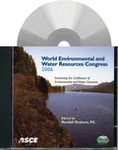Antibiotic Resistance Genes (ARG) as Emerging Environmental Contaminants
Publication: World Environmental and Water Resource Congress 2006: Examining the Confluence of Environmental and Water Concerns
Abstract
We are investigating antibiotic resistance genes (ARG) as emerging contaminants in the environment. The spread of ARG is a growing concern considering the increasing microbial resistance to antibiotics that is being observed world-wide. The development and spread of ARG responsible for imparting antibiotic resistance has been associated with the widespread use of antibiotics in livestock as well as humans. The purpose of this study was to quantify the occurrence of antibiotic resistance in the mixed-landscape Cache La Poudre River watershed, which has previously been studied and shown to have high concentrations of antibiotics correlating with urban and agricultural activity. In order to detect and quantify ARG in various environmental compartments, molecular biological methods were developed and applied to the environmental samples. Polymerase chain reaction (PCR) detection assays were conducted for seven sulfonamide resistance gene families using newly designed primers and eight tetracycline resistance gene families using previously published primers. Sul(I), sul(IT), tet(W), and tet(O) gene families were further quantified by real-time quantitative polymerase chain reaction (Q-PCR). Resistance to four classes of antibiotics (tetracyclines, sulfonamides, ionophores, and macrolides) was also investigated using a culture-based approach on antibiotic media. ARG were found to be present in river sediments, and their concentrations correlated to human and agricultural activity. The quantities of ARG normalized to the 16S rRNA gene copy number were statistically different between the sampling sites with different levels of human and agricultural input, and the pristine site being the lowest in all sampling events. These results suggest the need for increased involvement of environmental engineers to help understand the pathways of ARG in the environment and to develop treatment and mitigation strategies for minimizing the spread of ARG in the environment.
Get full access to this chapter
View all available purchase options and get full access to this chapter.
Information & Authors
Information
Published In
Copyright
© 2006 American Society of Civil Engineers.
History
Published online: Apr 26, 2012
ASCE Technical Topics:
- Agriculture
- Business management
- Design (by type)
- Engineering fundamentals
- Engineering materials (by type)
- Environmental engineering
- Human and behavioral factors
- Industrial wastes
- Irrigation engineering
- Load and resistance factor design
- Load factors
- Materials engineering
- Pollutants
- Polymer
- Practice and Profession
- River engineering
- Rivers and streams
- Solid wastes
- Structural design
- Synthetic materials
- Wastes
- Water and water resources
Authors
Metrics & Citations
Metrics
Citations
Download citation
If you have the appropriate software installed, you can download article citation data to the citation manager of your choice. Simply select your manager software from the list below and click Download.
